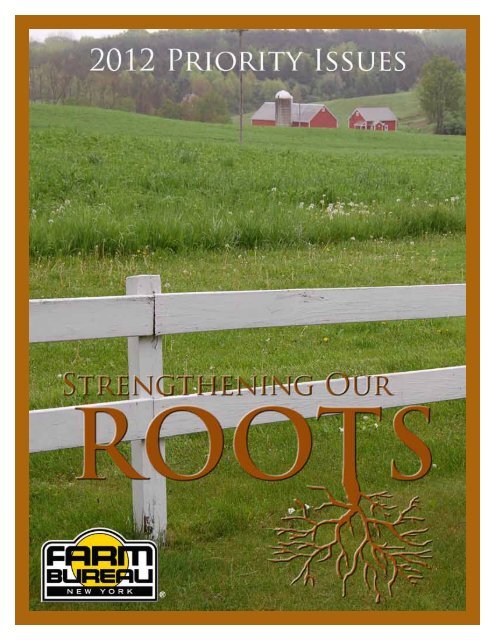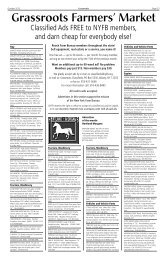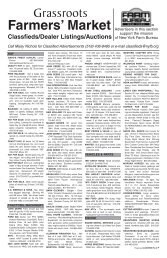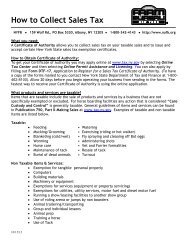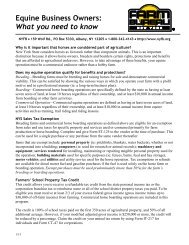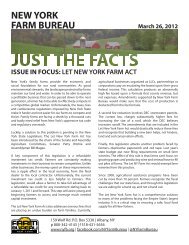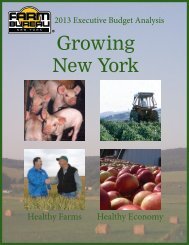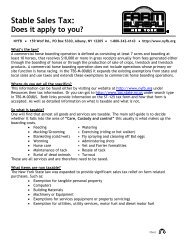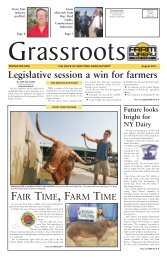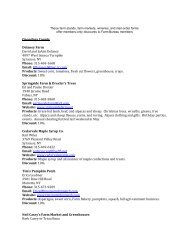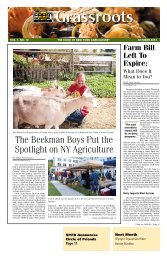New York Farm Statistics - New York Farm Bureau
New York Farm Statistics - New York Farm Bureau
New York Farm Statistics - New York Farm Bureau
- No tags were found...
Create successful ePaper yourself
Turn your PDF publications into a flip-book with our unique Google optimized e-Paper software.
Strengthening ourROOTSMeeting the Two Percent MandateGoal: If the recently enacted two percent property tax cap is to be ultimately successful, aggressive steps must betaken to provide municipalities, school districts and business owners with the flexibility to address the expense side ofthe ledger by reducing their operating expenses.• Oppose new unfunded mandates from <strong>New</strong> <strong>York</strong> State• Support for “Let NY <strong>Farm</strong>” legislation (S. 4340/A. 5286)• Decrease LLC filing fees• Remove MTA registration fee from farm vehicles• Reduce stormwater fees for agriculture• Return Agriculture Plate registration fees to prior levels• Reduce SPDES permit fees to $50 for farm wineries• Eliminate wholesaler reporting requirements for wineries• Support for tangible mandate relief for local governments in order to ensure the tax cap remains intact• Repeal the Wicks Law• Repeal the Triborough Amendment• Allow municipalities to bid on public works projects without adherence to federal prevailing wage rates• Require increase contributions to health insurance for public employees• Support additional mandate relief proposals put forward by the “Let NY Work” coalition• Support for Governor Cuomo’s initiative to engage in a comprehensive regulatory review process for agriculture toeliminate unfunded mandates on the industry.• Support for tort reform, including reform of Labor Law 240 and 241, along with inherent risk for equine and u-pickoperations.• Work with the Department of Environmental Conservation to ease requirements for clearing, cleaning thedredging ditches, streams, rivers and various tributaries that feed them.Supporting the State Budget InfrastructureGoal: <strong>New</strong> <strong>York</strong> State must ensure that food and livestock safety programs, along with other promotional, researchand economic development programs are properly funded in the final 2012-2013 state budget. Quite simply, our farmcommunities can not sustain any further state budgetary reductions in critical programs and services.• Support for funding for critical food safety, animal health and agricultural promotion and economic developmentprograms in the Agriculture and Markets budget.• Support for funding of Environmental Protection Fund programs that provide cost-sharing of critical farm waterquality and farmland protection projects that allow farms to reinvest in their farm business.• Support for funding for needed capital projects for the Cornell University College of Agriculture and Life Sciences.
Safe Natural Gas DrillingDrives Rural EconomicDevelopmentGoal: <strong>New</strong> <strong>York</strong> has a unique opportunity to takeadvantage of the abundant source of natural gas in theMarcellus Shale and Utica Shale. If done properly, thestate has the ability to stimulate the kind of economicrecovery that is so badly needed by farm families andothers throughout our state.• Support DEC’s efforts to finalize their dSGEIS topermit drilling for natural gas in the Marcellus andUtica shale.• Support funding for addition staff at DEC, NYSDAM,DOH, DOT, PSC and Taxation and Finance to providecritical regulatory oversight of natural gas drillingoperations.• Support bringing greater royalty equity to nonleasedlandowners that have been integrated againsttheir will in a spacing unit.• Increase compulsory integration thresholds forleased landowners within a spacing unit from 60percent to 75 percent.Increasing Connections toUrban ConsumersGoal: Buzzwords like “buy local” and “locavore” reflectgrowing consumer interest in local food markets andtheir interplay with farmers, consumers, local economiesand the environment. Consumers now recognize localfood consumption is no longer dictated by seasonalityand expect fresh, quality, affordable local food yearround.Specific policy changes and capital investmentsare needed to turn our complex web of food production,processing, transportation and distribution into aseamless, user-friendly food system for the farmer andurban consumer.• Policy and capital funding support to establishregional food hubs. Through local food aggregationand distribution, regional food hubs provide easyaccess, one-stop shopping for institutional and otherhigh volume buyers that are currently inaccessible to<strong>New</strong> <strong>York</strong>’s family farms.• Support funding for revitalization of Hunts PointMarket, with a locally grown market component.Outdated infrastructure and inadequate cold storagemakes Hunts Point Market unworkable for local farmbusiness.• Strengthen and promote networks of Greenmarketsin underserved areas. Access to urban marketsis crucial to farms engaged in direct sales.Greenmarkets provide the ideal outlet for the widediversity of <strong>New</strong> <strong>York</strong> grown products in an easilyaccessible, affordable and personable venue for theurban consumer.• Give priority to local food in state and localgovernment procurement for food programs andinstitutional purchases.• Support statutorily requiring an agriculturalrepresentative on the state procurement council.(S.4855/A.7515)
Meeting the 2% MandateOn June 24, 2011, Governor Andrew Cuomo signed a landmark 2percent real property tax cap into law. This cap was a critical first steptoward getting the state on sound financial footing.However, without adequate mandate relief, local governments willsuffer the consequences of the state’s extravagant spendingAccording to Robert Colby, a dairy farmer and Monroe County legislator,unfunded state mandates and inconsistent match levels for governmentprograms are crippling the county government,“It makes it difficult to set budgets and to make adjustments to ourbudgets,” said Colby. “Monroe County has already been forced to make cuts – cuts thatsignificantly harm the county’s quality of life. The county has slowedthe replacement of needed government vehicles, relied increasinglyon volunteers to fulfill the maintenance of county parks, and hiredfewer police to replace retiring officers. In total, Monroe County haseliminated more than 220 positions – positions that played importantroles in maintaining the county infrastructure and provided a living forMonroe County families.NAME:Robert ColbyFARM:Colby Homestead <strong>Farm</strong>sSpencerport, NYMonroe CountyPRODUCT:DairyAnd in spite of these drastic measures, Colby says none of them solvethe key problems facing county governments.“We’ve been fortunate to work around the edges and have avoidedcutting in other areas, but we’re just kicking the can down the road.”The 2 percent tax cap was a necessary measure, but it will not be effectiveunless the state provides critical mandate relief to local governments.Counties, cities, towns and villages across the state desperately needour help.
Safe Natural Gas DrillingThough Governor Cuomo continues to push for the introduction ofnatural gas drilling to <strong>New</strong> <strong>York</strong> State, the process remains in limbo—stuck in a constant cycle of comment periods.Meanwhile, our neighbors to the south continue to reap the benefits ofthe natural gas boom.Jim Van Blarcom, a farmer in Bradford County, Pennsylvania, hasmanaged to shore up his family’s financial future and expand his modestoperation into a fully modern dairy and swine farm. None of it would bepossible without natural gas.“We’ve grown and gotten rid of debt,” said Van Blarcom. “It’s given us amuch better-looking future for our family, and we’ve started hiring newpeople.”Naturally, the safety of the water supply has been called into question.Van Blarcom relies on clean water for his family and his livestock, so it isa chief concern.NAME:Jim Van BlarcomFARM:Van Blarcom-Lackey Dairyand Sow <strong>Farm</strong>Bradford County, PAPRODUCTS:Dairy, swine“I’ve heard of no one having problems with their water in our area,” VanBlarcom said.Van Blarcom credits hydraulic fracturing for building Bradford County’sinfrastructure and revitalizing its once-struggling economy. Roads havebeen rebuilt. Jobs have been created. And Bradford County now has amuch brighter future than it did a decade ago.A mere thirty miles from Jim Van Blarcom’s farm lies the Southern Tierof <strong>New</strong> <strong>York</strong> State, where farmers and rural landowners continue to beprohibited from leasing their lands for natural gas extraction. It’s time forthis endless delay to stop; it’s time for rural <strong>New</strong> <strong>York</strong>ers to experiencethe same benefits as their neighbors in the Keystone State.
Increasing Connections to UrbanConsumersNAME:John GlebockiFARM:J. Glebocki <strong>Farm</strong>sGoshen, NYOrange CountyPRODUCT:Vegetables<strong>New</strong> <strong>York</strong> farmers are fortunate to have the de facto capital of the worldon their doorstep.“Somewhere between 70 and 80 percent of our business is <strong>New</strong> <strong>York</strong>City,” said John Glebocki, who operates J. Glebocki <strong>Farm</strong>s in OrangeCounty.One of the most valuable resources for farmers looking to connectto rural consumers is the <strong>New</strong> <strong>York</strong> City Greenmarket. This program,founded in 1976 to provide fresh, high quality produce to NYC residents,has become a primary source of income for <strong>New</strong> <strong>York</strong> farmers.Glebocki first got involved with Greenmarket as a teenager, aiding hisuncle in growing and selling produce in the city. It has now become acritical component of his overall business, with the Glebockis’ producereaching 22 markets throughout the five boroughs.Although the Greenmarket program has been hugely successful, it stillhas yet to reach its full potential. One improvement Glebocki wouldlike to see is an increased amount of funding toward the purchase ofelectronic terminals. This allows low-income families receiving nutritionassistance to use their benefit cards toward high-quality produceinstead of heavily processed junk food.Furthermore, Glebocki would like to see greater collaborationbetween the various state and city agencies involved in the operationof the Greenmarket program, which would decrease the number ofbureaucratic issues that arise when marketing produce in the city.“They understand these farmers’ markets are very important tocommunities, but we have to make sure that they don’t have obstaclesto make it harder to get fresh produce to people.”We must work together to keep the Greenmarket program strong andto improve it for future generations of farmers and consumers.
NYFB Legislative ProgramsAdopt-a-Legislator Program<strong>Farm</strong>ers realize that not every lawmaker is fortunate enoughto have farms located in their home district. However, everyconstituent does need to eat, and therefore, everyone in <strong>New</strong><strong>York</strong> is impacted by the health of the farm economy.<strong>New</strong> <strong>York</strong> <strong>Farm</strong> <strong>Bureau</strong>’s county members “adopt” legislatorswho do not represent farm districts, frequently forming longstandingrelationships with city legislators and/or their staffmembers. Several county <strong>Farm</strong> <strong>Bureau</strong>s have hosted legislativetours and visits to farms in their counties for city legislators,while others simply visit with “adoptees” during our annualLobby Days. These relationships have proven to be valuableboth on the farm and in the capital.The Adopt a Legislator program is one of the most rewardingactivities for our members and for legislators, as it allows forthe even exchange of ideas and issues facing both rural andurban <strong>New</strong> <strong>York</strong>. Legislators are able to better understandthe challenges facing agriculture and our state’s farmfamilies. Likewise, farmers are able to learn about the uniquechallenges of their urban neighbors. Cooperating in this wayhas helped develop and implement creative solutions toshared problems.Circle of Friends Award<strong>New</strong> <strong>York</strong> <strong>Farm</strong> <strong>Bureau</strong> is a grassroots organization that doesnot endorse candidates. In order to recognize our legislativesupporters, we have a Circle of Friends program that is awardedat the end of every legislative session. This award is given tothose state legislators who have a superior voting record onissues of importance to <strong>New</strong> <strong>York</strong> agriculture.While the Circle of Friends award is not an official endorsement,it allows <strong>Farm</strong> <strong>Bureau</strong> to publicly thank specific legislators fortheir dedication and hard work on behalf of the agriculturalindustry. During each session year, <strong>New</strong> <strong>York</strong> <strong>Farm</strong> <strong>Bureau</strong>’sPublic Policy Division issues position statements on various billsrelating to agricultural issues and our state policy.The Circle of Friends award is distributed on the basis of alegislator’s voting record and sponsorship of bills that <strong>Farm</strong><strong>Bureau</strong> has either supported or opposed throughout the courseof the legislative session. Only bills of statewide importance tofarmers will be included within the Circle of Friends program.<strong>New</strong> <strong>York</strong> <strong>Farm</strong> <strong>Bureau</strong> announces award recipients at the end ofeach legislative cycle and presents the award to legislators at ourannual Lobby Day in Albany.
Public Policy DivisionJulie SuarezDirector of Public Policyjsuarez@nyfb.orgM. Kelly YoungAssociate Director of National Affairskyoung@nyfb.orgJeff WilliamsDeputy Director of Public Policy,Manager of Governmental Relationsjwilliams@nyfb.orgNicole WillisAssistant Director of Public Policynwillis@nyfb.orgCatherine MuralSr. Associate Director of Public Policycmural@nyfb.orgAdam SpechtAssistant Director of Public Affairsaspecht@nyfb.orgMatt NelliganDirector of Public Affairsmnelligan@nyfb.orgDawn PerreaultAdministrative Assistantdperreault@nyfb.org<strong>New</strong> <strong>York</strong> <strong>Farm</strong> <strong>Bureau</strong>800.342.4143View Online• Bill Memos• <strong>New</strong>s• Fact Sheetswww.nyfb.orgGrassroots <strong>New</strong>spaperDelivered Monthly to your inboxRequest your copy bye-mailing info@nyfb.orgNYFB E-<strong>Farm</strong> ReportSign up by e-mailingcmural@nyfb.org
159 Wolf Rd., P.O. Box 5330Albany, NY 12205p 800.342.4143 | f 518.431.5656www.nyfb.orgfacebook.com/NY<strong>Farm</strong><strong>Bureau</strong>


